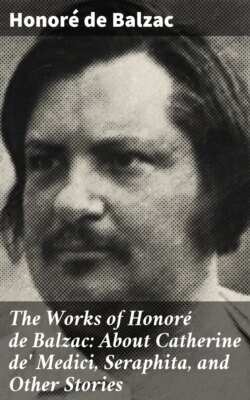Читать книгу The Works of Honoré de Balzac: About Catherine de' Medici, Seraphita, and Other Stories - Honoré de Balzac - Страница 5
На сайте Литреса книга снята с продажи.
ABOUT CATHERINE DE' MEDICI
ОглавлениеTable of Contents
To Monsieur le Marquis de Pastoret, Member of the Académie des Beaux-Arts.
When we consider the amazing number of volumes written to ascertain the spot where Hannibal crossed the Alps, without our knowing to this day whether it was, as Whitaker and Rivaz say, by Lyons, Geneva, the Saint-Bernard, and the Valley of Aosta; or, as we are told by Letronne, Follard, Saint-Simon, and Fortia d'Urban, by the Isère, Grenoble, Saint-Bonnet, Mont Genèvre, Fenestrella, and the Pass of Susa, or, according to Larauza, by the Mont Cenis and Susa; or, as Strabo, Polybius and de Luc tell us, by the Rhône, Vienne, Yenne, and the Mont du Chat; or, as certain clever people opine, by Genoa, la Bochetta, and la Scrivia—the view I hold, and which Napoleon had adopted—to say nothing of the vinegar with which some learned men have dressed the Alpine rocks, can we wonder, Monsieur le Marquis, to find modern history so much neglected that some most important points remain obscure, and that the most odious calumnies still weigh on names which ought to be revered?—And it may be noted incidentally that by dint of explanations it has become problematical whether Hannibal ever crossed the Alps at all. Father Ménestrier believes that the Scoras spoken of by Polybius was the Saôme; Letronne, Larauza, and Schweighauser believe it to be the Isère; Cochard, a learned man of Lyons, identifies it with the Drôme. But to any one who has eyes, are there not striking geographical and linguistic affinities between Scoras and Scrivia, to say nothing of the almost certain fact that the Carthaginian fleet lay at la Spezzia or in the Gulf of Genoa?
I could understand all this patient research if the battle of Cannae could be doubted; but since its consequences are well known, what is the use of blackening so much paper with theories that are but the Arabesque of hypothesis, so to speak; while the most important history of later times, that of the Reformation, is so full of obscurities that the name remains unknown of the man[A] who was making a boat move by steam at Barcelona at the time when Luther and Calvin were inventing the revolt of mind?
We, I believe, after having made, each in his own way, the same investigation as to the great and noble character of Catherine de' Medici, have come to the same opinion. So I thought that my historical studies on the subject might be suitably dedicated to a writer who has labored so long on the history of the Reformation; and that I should thus do public homage, precious perhaps for its rarity, to the character and fidelity of a man true to the Monarchy.
Paris, January 1842.
